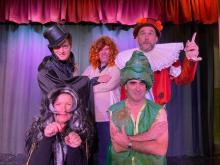I think I have always been interested in music. I still have a school report from a Catholic pre-school, I believe I was four years old, on which the sisters noted my interest. After passing through school recorder groups, school choirs, and trying various instruments, my serious interest in music was aroused when I took up the classical guitar, initially to get out of games lessons. In my 1970s, grammar school games felt little less than organised bullying!
My first guitar teacher, John Canning, to whom I owe so much, was completely dedicated to bringing out the best in his pupils. Along with the finest tuition, he often used to introduce his pupils (even beginners) to advanced works way before we were technically able saying “if a thing is worth doing, it’s worth doing badly.” Through the study of great works I gained an appreciation of the classical guitar repertoire and came to love its delicacy and intimacy of tone; for me there is no instrument like it. John became an Alexander Technique teacher and his teaching was strongly influenced by his knowledge of this technique.
Following these lessons I studied at the Guildhall School of Music with Gerald Lee and ended up working as a classical guitar teacher. To enhance my teaching I did some additional study of the Kodaly method and even now this still influences my approach to music tuition. The thing that most people remember about the Kodaly method is the seven hand signs which denote the notes of the scale but there is much more to it than that. I remember singing in a choir on a Kodaly summer school when the very strict Hungarian conductor was following a score, singing one part and signing two other parts simultaneously, one with each hand, I was struck by her musicianship!
Guitar music is beautiful, complex, intricate - the sound is small and pieces are rarely very long. That is the contrast that makes me enjoy singing with Royston Choral Society, I welcome the opportunity of learning large works, often written to the glory of God, and I enjoy being part of such a big sound, especially when we have an orchestra with us.
My favourite guitar pieces
I’ve been asked to recommend my favourite pieces of music and although I like a wide range of classical music I thought that I would mention the pieces of guitar music that have had the greatest impact on me, I have listened to these pieces since my school days.
First, Recuerdos De La Alhambra by Francisco Tarrega played by Andres Segovia. Tarrega taught Emilio Pujol who taught others who taught John Canning who taught me so I feel a connection with his works. This piece uses a technique called tremolo which is as near as the guitar can get to a sustained sound https://www.youtube.com/watch?v=sdaPoUNk5R8
Next, Bach’s Fugue in A minor. Bach arranges well for the guitar, as it does for many instruments, and I feel that the guitar can show aspects of Bach that other instruments can’t, although purists often disagree. This link is to the piece played by Julian Bream https://www.youtube.com/watch?v=2mZvdGAGlOo
One of my favourite guitar composers is Heitor Villa Lobos who combines classical form with Brazilian tonality. Here is Maria Callas singing Bachianas Brasileirs ( Bach in a Brazilian style!) No. 5 which was written with a guitar accompaniment; so well written it could be played as a solo piece of music. https://www.youtube.com/watch?v=P4wh5ScYcIw
Finally, in Spain there is a well-known poem by Jimenez called Platero Y Yo (Platero and I) about the author and his donkey who he confides in while he works. The Spanish composer Mario Castelnuovo-Tedesco wrote a beautiful suite of pieces to be played in conjunction with a reading of this poem. https://www.youtube.com/watch?v=WMpPUR2gWgA
 Royston Choral Society
Royston Choral Society










